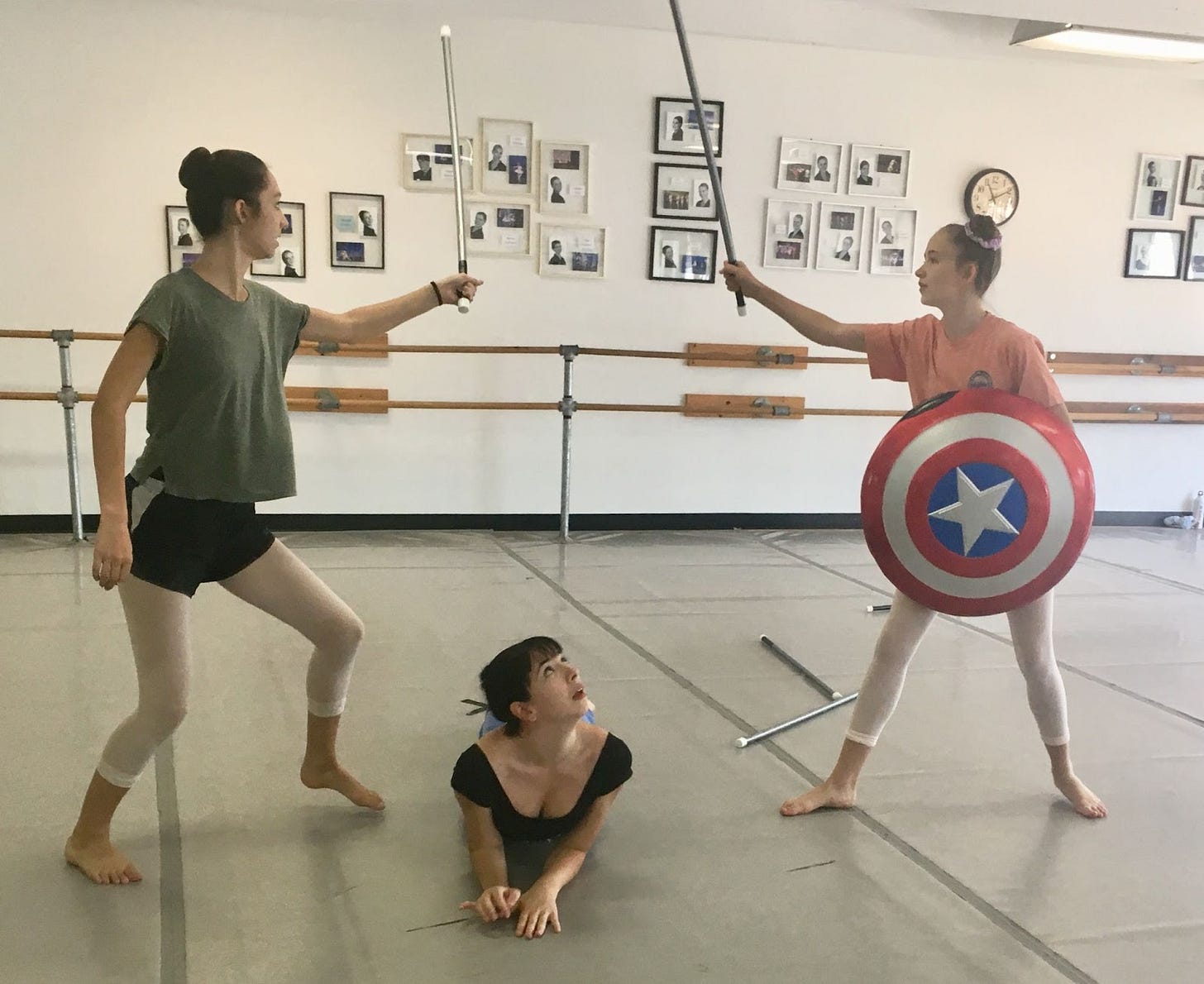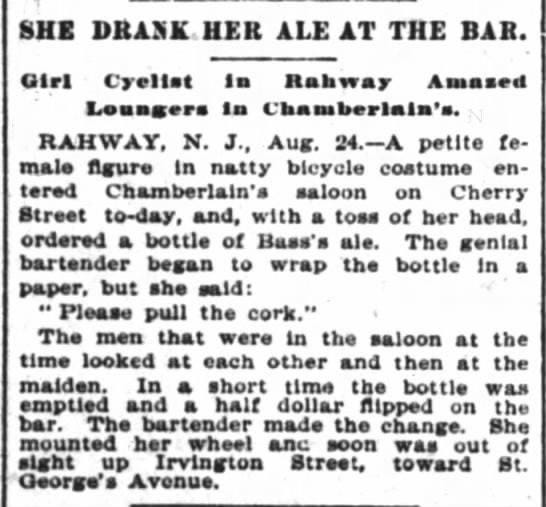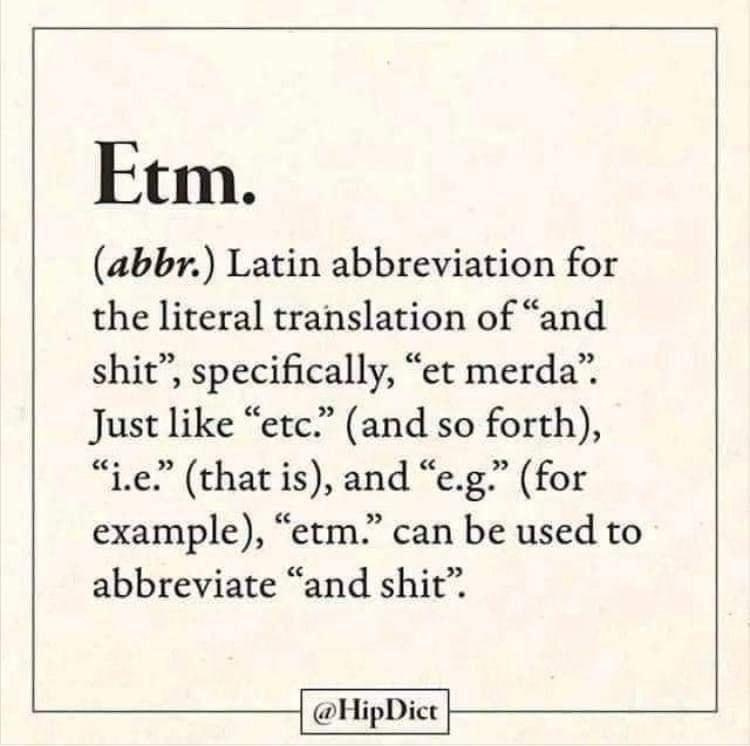Firegalash would be a great burlesque name, wouldn't it? Too late–I’m too well known by the one I have. Ah well–I’ll put it in my pocket. But I love this vocab word; it delights me and it feels very me, too. I wouldn’t say I’m disorderly, necessarily, but I definitely enjoy swearing. I cultivate my swearing as a writing professor and a linguistics nerd, in that I choose my words carefully. A good swear word can be an effective reinforcement, or a colorful alternative to a comma (like how some Brits use ‘cunt,’ or some New Yorkers use ‘fuck’). The history of various swear words and phrases is a delightful pastime to pursue, not only because of the rich history of the English language, but because it’s a lot of goddamn fun. I’ve used them through the years to make the boringest classes I teach more fun. For example:
Let me tell you about the time I left “What’s my Fucking Point?” written on the whiteboard in my Freshman Composition class. I was only mildly admonished afterward—this was in 2001, and the Department Chair of that English department was a lovely, salty, firebrand of a tough woman. She was a great boss, treated me as well as was possible, considering I was an adjunct, during her whole tenure. Not like the woman who came after her. Anyway. No, all she said was, “Hey, so—I swear blue fire myself, all the time, and it looks like you had a good reason for having it up there, but. You’ll want to make sure you remember to erase that. Or maybe alter the one word a little. I support it, but you never know who’s going to come across it and cause trouble for you.”
Pretty liberating stance, right? She knew that I was using that particular word for a particular reason, and just wanted to protect me from those who wouldn’t. And, since then, I have voluntarily changed the phrasing of that lesson, not because I’m giving in to prudishness, but because the classroom (and wider) social culture has changed a lot. I’ve changed the phrase because I, like any good writer, am thinking about my audience.
Oh, why on earth would I have “What’s My Fucking Point?” written on a classroom whiteboard? Ahem:
Please attend to Professor Jenn’s 2 rules for structuring yer basic college argument essay. They consist of two salty phrases. The first is:
What’s My (Freaking) Point?
This is my phrase for “thesis,” making the concept of composing a thesis much more accessible to those students who haven’t had a lot of good education or formal writing instruction in their past. So I tell them to pretend like they’re a movie camera, and pan in with the introduction, so we can see the whole picture of their topic. Then they come up with one sentence that tells me, the reader, what their (freaking) point is. Which is what a thesis is, after all. The second phrase?
Why the (Heck) Should You Care?
This is where we get into the body of the essay. You’ve told me your fucking point, now tell me why the hell I should care. Using between 3-5 different points, please, depending on the length of your essay. Use MLA format for your citations.
Of course, swearing and stage combat have gone together in my world since the very beginning. I began training in stage combat for the first time in 1995, and the rough-and-tumble world of half macho dojo bozo, half Fantasy fan “um, actually” dudebro, was replete with foul language. In a way, I came of age as a man, in the hypermasculinity of swordslinging and masculine overcompensation of the theatre guys. Between the hazing and the jovial roughness of being included in their bro-y shenanigans, I have a unique fondness for the loving shit-giving that dudes give each other. And I do pass some of the non-toxic versions of that down to my students. Certainly for college kids, but in stage combat courses for younger kids, too (something I did a bunch of this whole week), I still talk rather like a firegalash. Not quite to the rated-R version of swearing but I certainly don’t convert all the way to G, either.
I go to various middle and high schools to teach the basic techniques of theatrical combat and to help choreograph fight scenes for school shows that need it, same way I do for professional theatre companies. This week I was working with a middle school out of Arvada, who are doing Midsummer in their Shakespeare club, and Cherry Creek High’s production of Man of La Mancha. For both these age groups, it’s important to maintain a good balance of powerful geekiness and focused energy. And both age groups flourish under some mild shit-giving (though I tend to not use high octane cuss words with them). Neither age group needs instruction any different from the college kids, either, though behavior maintenance is (sometimes) more involved with the youngest ones. But there’s one particular instruction that tends to repeat since the first time it happened in my college course and then again with the Longmont bunheads.*
Longmont, Colorado (weirdly enough) boasts one of the highest quality top-tier ballet academies around, and for a few years I’d visit their summer intensives and teach the bunheads some stage combat techniques to add to their ballet techniques. These ballet students usually ranged from 10-11 to 18. So, middle through high school ages, again.
*bunhead = ballerina

When I guide the bunheads in the straight punch technique, I always need to stop and make sure their illusion of violence looks good. And they’re kids, in varying levels of development, and so are all of varying sizes and heights. So I say, “Make sure you’re crossing your fist across the plane of your partner’s face, otherwise it’ll look like you’ve punched their neck, or done the famous and deadly boob-punch.” …The phrase “deadly boob-punch” is the funniest thing ever uttered to all age ranges of these classes, apparently, and I stand by it.
I once said OMFG in a stage combat class and a couple of the students were scandalized and delighted. I only said the letters: o m f g, not the words the letters stand for. But I may as well have said the words, based on their reaction. This was in the late aughts, or was it early 20-teens? It’s fascinating stuff, when you look at acronyms like that when it comes to language evolution: the fact that in texts, I’ll write “hahaha” or “heh” or “lol” but that last is actually a word now–nobody really thinks (or does) “laugh out loud” when they see that. It’s a word: lol. Pronounced “lahl.” It’s a word that has its own meaning. But at that time, OMFG wasn’t a word on its own. Is it now? It doesn’t seem like it—it seems like none of the other text-y acronyms have had that full transformation all the way into word-dom, but I could be wrong. I need to pick up McCulloch’s Because Internet again…
Smoking, swearing, going to the pub, being an actor, etm.*—all these things add up to a picture of a disreputable woman. It feels quite Victorian, doesn’t it? Especially when we’re talking about all those things that I do–all of the above, and for the past few years, including burlesque and other spicy stuff.
The smoking & swearing & drinking are considered “manly” pursuits, though, right? Like the swordslinging was and is. Being an actress (especially one that strips), is different—it’s about whorishness, not manliness. Does that mean my brand of firegalash is both these disreputable things at once? Manly and slutty? I mean, if the shoe fits…
This all is reminding me of that Victorian concept of ‘Bicycle Face,’ that I’ve written about here before. The bicycle as a new technology meant so much for women’s lib, in those early days of the suffragette. Riding a bicycle was up there with smoking, drinking, and swearing, for sure. And then in the 1920s you’d have these firegalashes* wearing no corset under their dropped-waist, knee-length dresses. They cut their hair and they’d paint flowers on their knees and smoke and dance and flap their flapper fringe around in nightclubs.
*Doesn't this make you think of burning rain boots? Just me? No?…I’ll see myself out.

Whilst this article is being auto-published, I’m going to the opera and a very posh hotel with my partner to celebrate my birthday. I ought to behave, and not be such a firegalash. It’s the opera, after all. But.
Actually one of our most treasured practices at the opera is to people-watch and snark heavily about the outfits we see. With whiskey in hand. So. Yeah.
Might as well not fight it.






Stage combat for bunheads would be a fantastic title for just about anything. I’m delighted to see another etymology geek here. I learn some great vocab from my incarcerated students (who never swear in front of me) and from my daughter, who teaches high school in a colorful district.
Delightful! I love both “firegalash“ and “etm.”